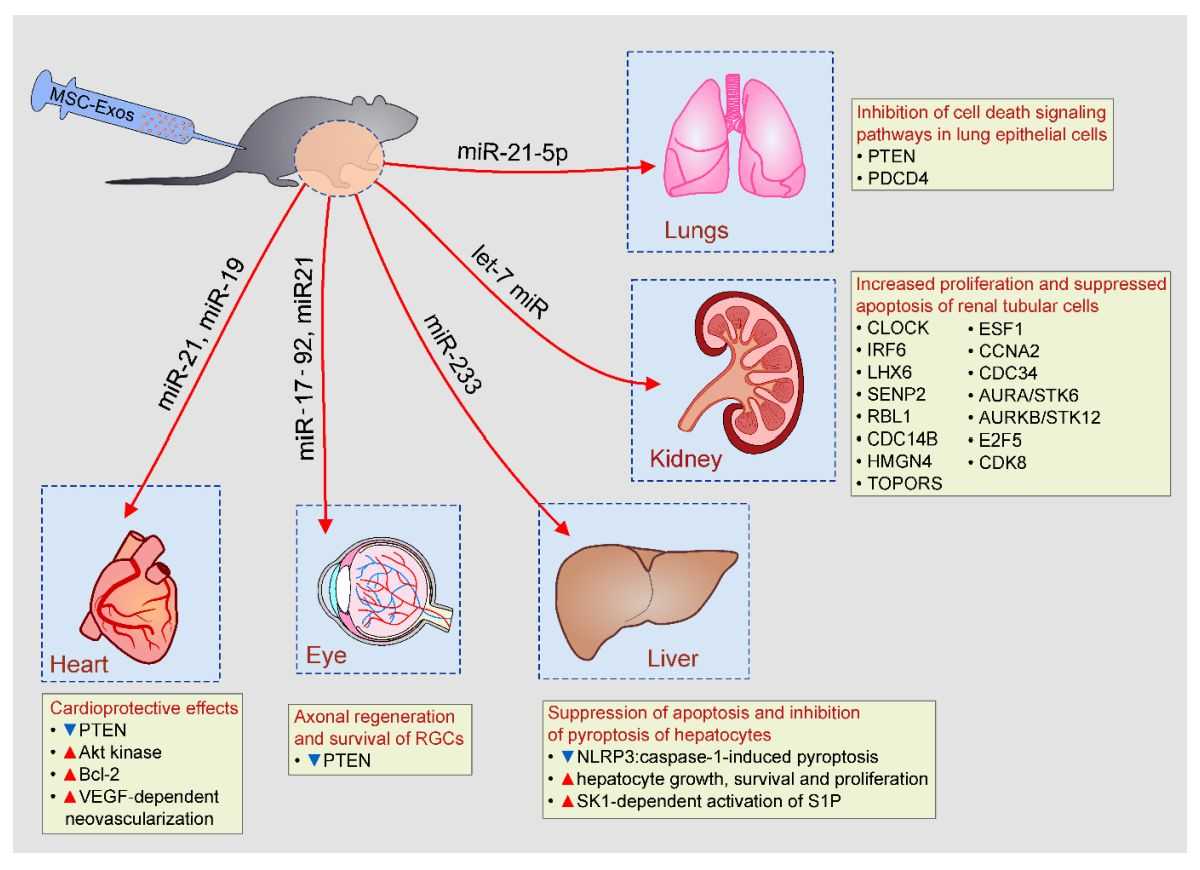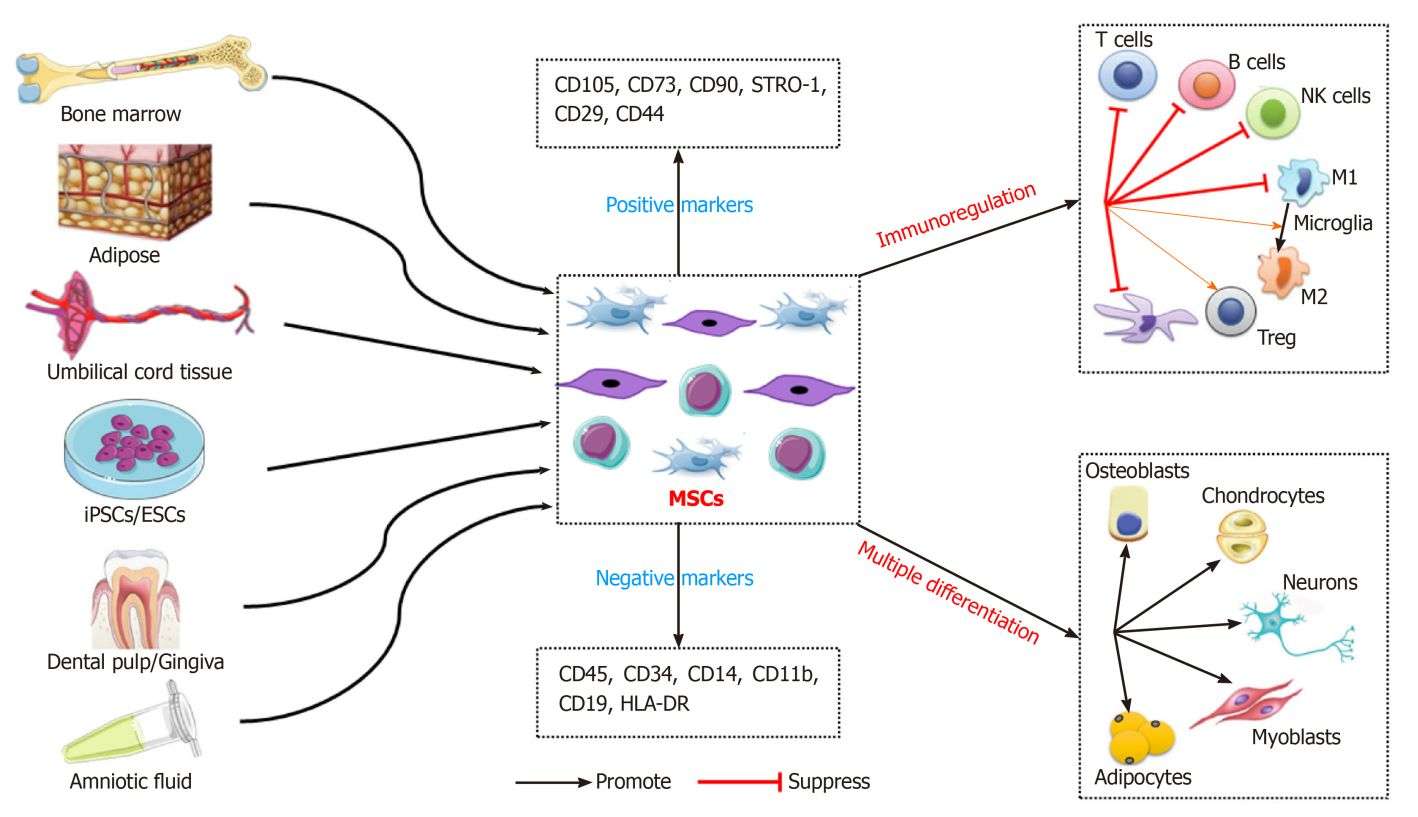Mesenchymal Stem Cell-derived Exosomes (MSC-Exos) in Regenerative Medicine
The role of mesenchymal stem cells (MSCs) in regenerative medicine is largely realized by their paracrine dominance. With in-depth studies, researchers have gradually discovered the important regulatory role of the paracrine mechanism, and exosomes, as an important active substance in the paracrine mechanism, have been proved by more and more experiments to play a key role in the repair of damaged tissues and tissue regeneration by MSCs. Currently, the application of MSC-Exos in tissue regeneration as a highly potential therapeutic strategy has received widespread attention.
 Figure 1. Role of MSC-Exos in tissue repair and regeneration. (Harrell CR, et al., 2020)
Figure 1. Role of MSC-Exos in tissue repair and regeneration. (Harrell CR, et al., 2020)
MSC-Exos vs. MSCs
MSCs are one of the most clinically used stem cells in regenerative medicine. However, the number of MSCs is limited due to the drawbacks of primary MSCs, such as limited cell proliferation capacity and rarity in tissues. In addition, the gradual loss of differentiation during in vitro expansion reduces the efficacy of MSCs, as well as the variation between donors increases the uncertainty of MSCs, greatly hindering the clinical use of MSCs. The use of stem cell-derived exosomes can better circumvent many of the shortcomings of existing stem cell therapies, especially MSC-Exos. MSC-Exos contain a large number of active molecules associated with tissue regeneration, making them an effective means of cell-free therapeutic strategies with similar effects to MSCs.
Mechanisms of MSC-Exos in Tissue Regeneration
Paracrine Signaling - MSC-Exos contain a range of bioactive molecules including growth factors, cytokines, and signaling proteins that can be delivered to target cells.
Promotes Angiogenesis - MSC-Exos carry pro-angiogenic factors that stimulate the formation of new blood vessels (angiogenesis).
Anti-apoptotic effects - MSC-Exos have anti-apoptotic properties that prevent programmed cell death in damaged tissues.
Anti-inflammatory - MSC-Exos can modulate the immune response by reducing the production of inflammatory cytokines and promoting an anti-inflammatory phenotype in immune cells.
Extracellular Matrix (ECM) Remodeling - MSC-Exos can influence the deposition and organization of the ECM, providing structural and functional support for regenerative tissues.
Differentiation Induction - MSC-Exos can carry specific signaling cues that can induce the differentiation of endogenous stem/progenitor cells into cell lineages required for tissue regeneration.
 Figure 2. Schematic of regenerative medicine with MSC-Exos. (Ma ZJ, et al., 2020)
Figure 2. Schematic of regenerative medicine with MSC-Exos. (Ma ZJ, et al., 2020)
Regenerative Applications of MSC-Exos
- Neurological Regeneration
MSC-Exos show therapeutic advantages for neurological disorders and neurodegenerative diseases. Treatment of damaged cells with adipose mesenchymal stem cell exosomes shows that the exosomes contain a large number of cytokines that have a certain protective effect on brain damage, such as insulin growth factor and hepatocyte growth factor, which can improve the survival rate of damaged cells and realize the protective effect on nerve damage.
- Cardiovascular Regeneration
The importance of exosomes and their miRNAs in intercellular communication within the cardiovascular system has been demonstrated. The research team mixed MSC-Exos with fibrinogen to make a solution and then sprayed the solution and thrombin solution onto the damaged heart to form a protective film to repair the damaged heart. This approach improves heart function and promotes endogenous angiogenesis in the damaged heart.
- Kidney Damage Repair
It has been reported that stem cell-derived conditioned medium can promote recovery from ischemic kidney injury. Exosomes derived from human umbilical cord mesenchymal stem cells are injected into the renal capsule of mice with acute kidney injury and are found to be able to reduce the formation of harmful substances, resist drug-induced oxidative reactions, inhibit renal cell apoptosis, and promote renal cell proliferation through activation of the ERK1/2 pathway, ultimately reducing kidney injury.
- Liver Injury Repair
In recent years, MSC-Exos have been used as a therapeutic option for liver injury repair. Some scholars used carbon tetrachloride to induce hepatic fibrosis in mice and then injected human umbilical cord mesenchymal stem cell exosomes directly into the liver, which is found to be able to reduce the expression of transforming growth factor TGF-β1 in hepatocytes, reverse the epidermal mesenchymal transformation of hepatocytes by blocking the phosphorylation of the Smad2 signaling pathway, and ultimately reduce the deposition of collagen and promote the repair of liver injury.
- Bone, Cartilage, and Skeletal Muscle Regeneration
In the cardiotoxin-induced skeletal muscle damage model in mice, histological results after local injection of MSC-Exos showed that compared with the control group, the fibrous area of the experimental group was reduced and a large number of myofibers and capillaries were formed, suggesting that MSC-Exo can promote skeletal muscle regeneration.
- Skin Regeneration
MSC-Exos can promote fibroblast migration, proliferation, and collagen synthesis in a dose-dependent manner. In the mouse skin incision model, after intravenous injection of Exos, Exos could be recruited to the soft tissue trauma area, and by altering the properties of fibroblasts, it could promote the formation of collagen types I and III in the early stage of wound healing, and inhibit the expression of collagen in the late stage to inhibit the formation of scar, and ultimately promote the healing of skin wounds.
Today We Offer
The potential of MSC-Exos as a newly discovered biological tool has already been seen. With the increasing development of medicine, its functions are being utilized in more and more fields.
As a pioneering force in exosome research, Creative Biostructure is committed to unlocking the remarkable regenerative potential of MSC-Exos. With extensive expertise in exosome isolation, characterization, engineering, and analysis, we provide our clients with a reliable supply of high-quality MSC-Exos to explore the multifaceted mechanisms by which these extracellular vesicles drive tissue repair and regeneration. Feel free to contact us as we utilize the regenerative capabilities of MSC-Exos to develop innovative solutions capable of restoring damaged tissues, paving the way for breakthroughs in wound healing and organ repair.
| Cat No. | Product Name | Source |
| Exo-SC02-1 | HQExo™ Exosome-PCS-500-012 | Exosome derived from human bone marrow-derived mesenchymal stem cell line (PCS-500-012) |
| Exo-SC02-2 | HQExo™ Exosome-Pla-MSC | Exosome derived from human placental derived mesenchymal stem cell |
| Exo-SC01 | HQExo™ Exosome-PCS-500-011 | Exosome derived from human pre-adipose derived mesenchymal stem cell (PCS-500-011) |
| Exo-SC03 | HQExo™ Exosome-hTERT | Exosome derived from hTERT-immortalized Mesenchymal Stem Cell |
| Exo-SC04 | HQExo™ Exosome-MSC | Exosome derived from Xeno-Free Human Mesenchymal Stem/Stromal Cells and Media |
| Exo-C02 | CosExo™ Exosome-hMSC | Exosome derived from Human Umbilical Cord Mesenchymal Stem Cell |
| Explore All Exosome Isolated from Stem Cell Lines | ||
References
- Harrell CR, et al. Therapeutic Use of Mesenchymal Stem Cell-Derived Exosomes: From Basic Science to Clinics. Pharmaceutics. 2020. 12(5): 474.
- Ma ZJ, et al. Mesenchymal stem cell-derived exosomes: Toward cell-free therapeutic strategies in regenerative medicine. World J Stem Cells. 2020. 12(8):814-840.